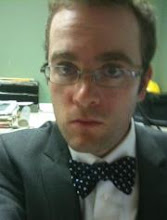Last night, January 11, 2008, psychology professor James Alcock presented a talk entitled "The Appeal of Alternative Medicine at CFI:Ontario.
I don’t see much threat in alternative medicine since, to me; the believers are the only ones who are getting hurt. People should be free to waste their lives and money on whatever they want and I have enough things happening in my life to care about yours. Since I’ve also taken more than my fair share of science lectures in university, I assumed this would be another boring talk about a boring subject.
For the most part, my predictions were accurate, although the talk was still entertaining and I sensed that the almost full house found the subject interesting.
Throughout the longer-than-necessary introductions about upcoming events at CFI (anyone can look them up on the website), James Alcock’s numerous credentials and experiences were laid out ad nauseum to a point where I sometimes think these talks are more about promoting the speakers than promoting the subject.
Alcock introduced his talk with a movie he took in China about a Qi Gong master who looks more like the guy at the night club on Special K than an ancient healer. The powerpoint slides that contained the bulk of the lecture were a little lame (Don’t ever attach sound to your presentation!) although he routinely included applicable cartoons that lightened an otherwise dull performance.
Alcock presented a good history of the medical profession, noting that we really haven’t changed much over the last thousand years. He noted how magic developed in ancient times to fill the gaps of our knowledge and how these eventually evolved into religion.
I dozed off a little throughout the history bits but from what I understood, the Greeks were the first to use evidence based techniques to solve problems but the Romans didn’t continue these techniques so when the Christians took over, Europe had lost most of its problem solving skills. Luckily, the (comparatively) progressive Islamic nations held onto the old Greek textbooks while Europe buried itself under Christianity for a few hundred years. Alcock did like to throw in some useless but interesting trivia every few minutes (Did you know that Muslims built the first mental hospital?).
Alcock continued with the rise of university-based education that eventually led to the famous Flexner’s Report that states that doctors should be trained by scientists, not by doctors (it was previously customary for doctors to train by apprenticeship). Next was the rise of pharmaceuticals where doctors now seem to prescribe a drug for everything rather than actually treating patients.
Alcock’s main thesis was that alternative medicine’s current popularity is due to the lack of patient care. Doctors today tend to ask you a few questions and then prescribe you a drug. There is little patient contact and people tend to leave the doctor’s office confused. Since alternative medicine practitioners seem to actually care about the patient, the patient automatically feels more comfortable, completely ignoring the fact that the medicinal part is complete bullshit. This is an interesting point, since it leads to the argument that if we were to privatize our health care industry, the doctors might want to actually find out what’s wrong with you rather than push you out as quickly as possible (under our socialist system, doctors get paid on the quantity of care, not the quality).
In his section about the current state of universities, Alcock attacked post-modernism, which seemed out of place but not surprising since science-minded people hate others who rely on emotion rather than facts. He also criticized his students for having lost the ability to write which I agree completely since I can remember trying to proofread my engineering classmates’ undergrad thesis papers only a few years ago.
Alcock concludes by criticizing the government’s self-regulation rules that give pseudo-scientific ‘professions’ like chiropractors their own government funded agency, thus also giving them legitimacy in the eyes of the people. His overall message seemed to be that people want to avoid pain, rather than work hard for a cure. I interpret this message as people are too stupid and lazy to treat themselves effectively, so they look for whatever is the quickest and easiest way that makes them feel better even though they really never will.
Oh well, as my first paragraph mentions, as long as people want to waste their own time and money, they should be free to do as they please. My only complaint is that since our health care is publically funded, I end up paying when these alternative methods fail and people end up visiting the real doctors too late, thus making treatment more expensive.
Overall, Alcock stayed within his area of expertise and seldom strayed even when asked by members of the audience (he was often asked questions only a doctor should answer. Alcock is a Psychologist). During the Q and A, he answered the questions effectively and with confidence and always seemed in control throughout his presentation. Although I didn't find the topic interesting, Alcock did a good job presenting his ideas and most people seemed to enjoy themselves so I imagine the evening was successful.
